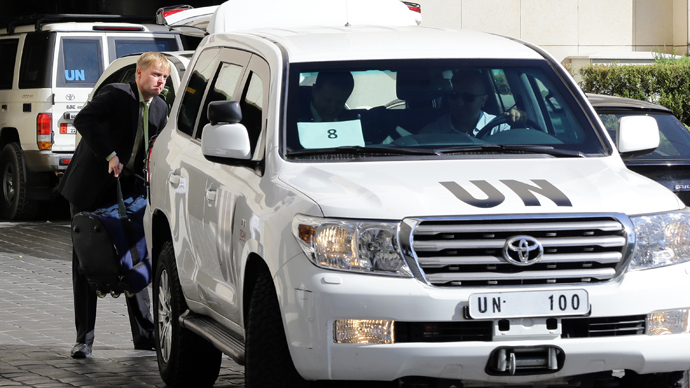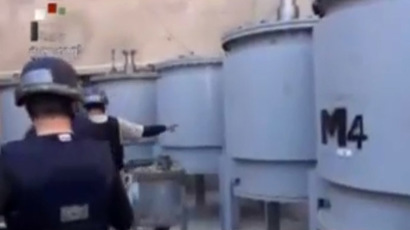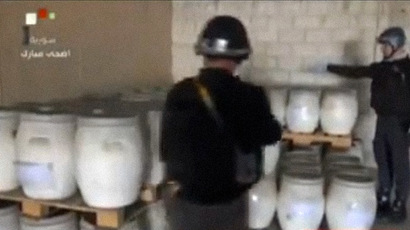Chemical weapons watchdog appeals to private firms to destroy Syria stockpile

The Organization for the Prohibition of Chemical Weapons (OPCW) is urgently seeking for willing parties and a port to help in the destruction of Syria’s 1,000-metric ton arsenal stockpile of toxic agents.
The OPCW is posting requests for "expressions of interest"
from companies that would facilitate "the treatment and
disposal of hazardous and non-hazardous organic and inorganic
chemicals," AP quotes. A formal request to bid for commercial
contracts is expected later in the day.
A senior OPCW official told the agency on condition of anonymity
Thursday that more than 700 tons of chemicals listed could be
eliminated at regular commercial facilities. The most hazardous
chemical agents would still have to be disposed of at a secure
location under OPCW supervision.
A site, however, is yet to be found.
The report comes nearly a week after Albania, a NATO member state
of 2.8 million people, rejected a US plan to destroy the nerve
agents on its territory.
Albania, a staunch US ally, was the first country in the world to
eliminate its own Cold War-era chemical weapons stockpile in
2007, a $48 million dollar undertaking mostly paid for by
Washington.
Albanian Prime Minister Edi Rama, facing a November 15 deadline
to finalize the plan, was facing mounting public pressure to
scrap it.
Rama, who had spent the previous week negotiating with the US
ambassador to Tirana, finally balked at the plan on Friday during
a televised address.
“It is impossible for Albania to take part in this operation," Reuters reports him as saying.

Albania's decision to back out has left US diplomats scrambling to find an alternative location to get the chemical weapons out of Syria.
The Hague-based global watchdog, along with Western officials,
told Reuters on Tuesday that the chemical arsenal could be
destroyed in the ocean, either on a ship or by loading them onto
an offshore rig.
“The only thing known at this time is that this is technically feasible,” an OPCW official said.
In addition, the OPCW views another 500 tonnes of Syria
chemicals, including actual nerve agents, as too dangerous to
import into any country - or process commercially. Destroying
them would require an off-shore treatment, presumably, on a US
ship.
That process would also yield large volumes of toxic waste to be disposed of. For that, the chemical watchdog would also need to find a port in the area where it could oversee the off-shore work and ship out the waste.
"They are now looking around the Mediterranean region for countries with industrial waste capacity," a source involved in the discussions told Reuters. "It's ambitious."
The OPCW has until December 2 to identify companies "for destruction in commercial chemical disposal facilities of the binary chemical weapons components," according to the body's Executive Council Friday decision.
Under a plan hammered out by out by Washington and Moscow
in September, the majority of the deadliest agents, including
mustard gas, sarin and VX nerve agents, should be moved out of
the country by the end of 2013 and eliminated by mid-2014.
Assad agreed to surrender the weapons and join the Chemical
Weapons Convention after US President Obama threatened a limited
military campaign in response to an August 21 sarin gas attack
that is suspected to have killed over 1,000 Syrian civilians in a
Damascus suburb.













